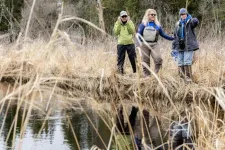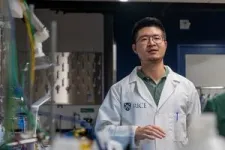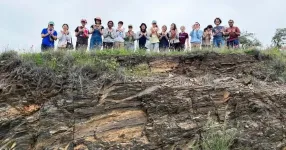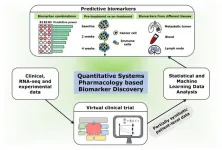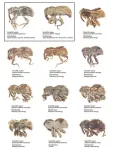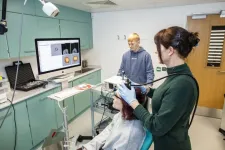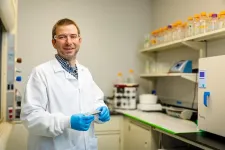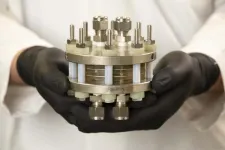(Press-News.org) A new paper published today, led by Chicago’s Shedd Aquarium, reveals how volunteers across Illinois, Wisconsin and Michigan enabled researchers to gather seven years of data on the spawning migrations of suckers, an understudied yet essential group of freshwater fishes. Using observations collected by trained members of the public, the collaborative team of researchers have discovered that temperature is the primary trigger for sucker spawning migration, which can help inform conservation strategies in light of a changing climate.
“We believe that conservation of native, non-game fishes will only be effective if concerned members of the public are advocating for the animals as well as their environments,” said Dr. Karen Murchie, director of freshwater research at Shedd Aquarium and lead author on the study. “Our volunteer network highlights the untapped potential for involving the public in studies on migratory fishes.”
To address the lack of knowledge about suckers and boost public appreciation of these non-game fishes, the research team developed the idea of a program enlisting help from volunteers to monitor the timing of sucker migration. This included monitoring creeks and rivers for the presence of white suckers (Catostomus commersonii) and longnose suckers (Catostomus catostomus) along the western shore of Lake Michigan and southern shore of Lake Superior.
Volunteers across three states went to a specific monitoring site every day for six to eight weeks during the spring. At the site, volunteers recorded various environmental conditions and documented the absence or presence of suckers. Additionally, a data logger in the water regularly recorded the temperature and water depth, which was used to assess migration cues.
From 2017 to 2023, 77 unique volunteers participated in the program with an average of 45 volunteers per year. During most years, the network of volunteers monitored at least 14 tributaries each day – a much wider range than any single institution could accomplish. Through the program, volunteers became strong advocates for suckers. They shared conservation messaging with their peers, garnering invaluable support for restoration efforts and shifting the public perception of native non-game fishes.
“Prior to my involvement in this program, I always thought of suckers as a ‘rough fish,’” said Frank Langley, a volunteer. “My viewpoint has now dramatically changed, and I enjoy sharing the importance of suckers to the ecosystem with others while at the field site and elsewhere.”
The data from the first seven years of monitoring reveal that temperature is the primary trigger for sucker spawning migration. Specifically, migration usually begins when multiple days in a row reach a temperature of 6.3 degrees Celsius (43.3 degrees Fahrenheit) or higher. This finding has implications for local Great Lakes ecosystems, as warmer winters could result in suckers migrating early. This in turn can affect the nutrients and food available to other animals, many of which rely on suckers to survive.
Suckers are the most abundant migratory fishes in the Great Lakes region. They serve as a food source for many other animals (including gamefish, mammals and birds) and add important nutrients to the water when they reproduce. Despite these key benefits to freshwater ecosystems, suckers are understudied and underappreciated, with some people killing suckers and leaving them onshore under the misconception that they have no value.
“If you love trout, you can thank a sucker for helping them survive,” said Murchie. "Our volunteers play a critical part in raising awareness and compassion for suckers, and we encourage everyone to join in the effort to care for and conserve wildlife and freshwater ecosystems for generations to come.”
At Shedd Aquarium, guests can connect with local freshwater species – including suckers – in the At Home on the Great Lakes gallery. Shedd also offers other regular volunteer opportunities in local natural areas to restore and protect spaces for people and animals alike. Individuals or groups looking to make a difference can sign up for Action Days.
The full findings from this research have been published in a special edition of Environmental Biology of Fishes under the title, “For the love of suckers: scientific benefits of engaging volunteers to monitor migrations and advocate for native non-game fishes.”
END
For the love of suckers: Volunteers contribute to research on key freshwater fishes
Seven years of data reveals the main trigger for sucker spawning migration
2024-10-29
ELSE PRESS RELEASES FROM THIS DATE:
Bill and Mary Anne Dingus commit $1M to fund Human Impacts on the Earth Fund at Rice
2024-10-29
Bill Dingus ’81, a Rice University alumnus, and his wife Mary Anne have pledged $1 million to support the university’s Human Impacts on the Earth Fund, dedicated to mitigating and addressing the negative environmental effects caused by human activities on the planet. Additionally, the Dingus family is matching other donors’ contributions to the fund up to $250,000.
The Dingus’ donation enables the launch of the Earth and Planetary Opportunities in Research (EXPLORE) program, a new initiative offered through the Department of Earth, Environmental and Planetary Sciences (EEPS) that allows undergraduates of any major hands-on experience in research projects ...
Most patients can continue GLP-1 anti-obesity drugs before surgery
2024-10-29
Most patients may continue to safely take glucagon-like peptide-1 (GLP-1) receptor agonists as prescribed before undergoing elective surgery and gastrointestinal endoscopies, according to new clinical guidance released today by five surgical and medical societies including the American Society for Metabolic and Bariatric Surgery (ASMBS), American Society of Anesthesiologists (ASA), American Gastroenterological Association (AGA), International Society of Perioperative Care of Patients with Obesity (ISPCOP), and Society of American Gastrointestinal and Endoscopic Surgeons (SAGES).
The guidance, published online in Surgery for Obesity and Related Diseases ...
Computational tool developed to predict immunotherapy outcomes for patients with metastatic breast cancer
2024-10-29
FOR IMMEDIATE RELEASE
Using computational tools, researchers from the Johns Hopkins Kimmel Cancer Center and the Johns Hopkins University School of Medicine have developed a method to assess which patients with metastatic triple-negative breast cancer could benefit from immunotherapy. The work by computational scientists and clinicians was published Oct. 28 in the Proceedings of the National Academy of Sciences.
Immunotherapy is used to try to boost the body’s own immune system to attack cancer cells. However, only some patients respond to treatment, explains lead study author Theinmozhi Arulraj, Ph.D., a postdoctoral fellow at Johns Hopkins: “It’s really important ...
Cerebral embolic protection by geographic region
2024-10-29
About The Study: The PROTECTED transcatheter aortic valve replacement (TAVR) trial could not show that the use of cerebral embolic protection (CEP) had a significant effect on the incidence of periprocedural stroke during TAVR. Although there was no significant interaction by geographic region, this exploratory post hoc analysis suggests a trend toward greater stroke reduction in the U.S. cohort but not in the outside the U.S. cohort. These findings are hypothesis generating, and further research is needed to determine if regional differences in patient characteristics or procedural practices ...
12 new Oriental weevil species discovered using advanced imaging tools
2024-10-29
Jake Lewis, an entomologist in the Environmental Science and Informatics Section at the Okinawa Institute of Science and Technology (OIST), is fascinated by weevils, a diverse group of beetles that includes many species with elephant trunk-like mouthparts (called a rostrum). Weevils provide various ecosystem services such as pollination and decomposition, but some species are serious pests known to decimate crop fields and timber forests.
Using x-ray microtomography, a 3D imaging technique ...
Ultrasound can be used as search and rescue tool for the brain
2024-10-29
Ultrasound, once used almost exclusively to take images of the body, is quickly developing into a targeted therapy that can have a potentially life-changing impact on our brains, according to the authors of a new article.
For decades, health professionals across the world have used ultrasound as a means of monitoring the development of unborn babies and assessing the health of patients’ internal organs.
But writing in the journal PLOS Biology, researchers from Stanford University, the University of Plymouth, and Attune Neurosciences say it has now been demonstrated to offer a non-invasive and precise way of targeting ...
Department of Defense funds study of gene therapy for muscular degeneration
2024-10-29
The U.S. Department of Defense awarded just under $514,000 to an interdisciplinary team of researchers at the U of A to study the efficacy of “self-delivering” gene editors in the treatment of Duchenne Muscular Dystrophy, or DMD.
DMD results from a mutation in the dystrophin gene and is one of the most severe inherited muscular dystrophies, leading to deterioration of the muscle fibers. Presently, there is no cure, but advances in treatment have helped patients live longer, better lives.
Gene therapy designed to ...
People’s exposure to toxic chemicals declined in the U.S. following listing under California law
2024-10-29
With growing concern about the ubiquity of toxic chemicals in consumer products, many states have passed laws aimed at protecting people from harmful substances in everyday items like cosmetics, cleaning supplies, plastics, and food packaging. California’s Proposition 65, for instance, is considered one of the most extensive toxics laws in the country.
But does the law work? According to a new study published in the journal Environmental Health Perspectives, it does.
“Not only have people’s exposures to specific toxic chemicals gone down in California, ...
Trauma, homelessness afflict gender affirming care patients at higher rates
2024-10-29
A survey of patients receiving gender affirming care shows that commercial insurance pays for most of their treatments, they receive less care in the South than other parts of the U.S. and they deal with disproportionate levels of housing insecurity and trauma compared to others, according to a new study by researchers at the Colorado School of Public Health and the University of Colorado Anschutz Medical Campus.
The study, using data provided by Kythera Labs, a healthcare clearinghouse, examined millions of insurance claims by patients undergoing gender affirming care (GA) and those not. It also looked at social determinants of healthcare (SDOH), non-medical factors ...
New $5 million DoE award supports KU startup’s green hydrogen energy research
2024-10-29
LAWRENCE — With $5 million in support from the U.S. Department of Energy, the University of Kansas and Avium — a startup firm founded by researchers from KU’s School of Engineering — aim to make clean hydrogen more affordable.
According to the DoE, the work at KU is part of $750 million in funding for 52 projects across 24 states “to dramatically reduce the cost of clean hydrogen and reinforce American leadership in the growing hydrogen industry.”
Green hydrogen is a key tool in the worldwide ...
LAST 30 PRESS RELEASES:
Tundra tongue: The science behind a very cold mistake
Targeting a dangerous gut infection
Scientists successfully harvest chickpeas from “moon dirt”
Teen aggression a warning sign for faster aging later in life
Study confirms food fortification is highly cost-effective in fighting hidden hunger across 63 countries
Special issue elevates disease ecology in marine management
A kaleidoscope of cosmic collisions: the new catalogue of gravitational signals from LIGO, Virgo and KAGRA
New catalog more than doubles the number of gravitational-wave detections made by LIGO, Virgo, and KAGRA observatories
Antifibrotic drug shows promise for premature ovarian insufficiency
Altered copper metabolism is a crucial factor in inflammatory bone diseases
Real-time imaging of microplastics in the body improves understanding of health risks
Reconstructing the world’s ant diversity in 3D
UMD entomologist helps bring the world’s ant diversity to life in 3D imagery
ESA’s Mars orbiters watch solar superstorm hit the Red Planet
The secret lives of catalysts: How microscopic networks power reactions
Molecular ‘catapult’ fires electrons at the limits of physics
Researcher finds evidence supporting sucrose can help manage painful procedures in infants
New study identifies key factors supporting indigenous well-being
Bureaucracy Index 2026: Business sector hit hardest
ECMWF’s portable global forecasting model OpenIFS now available for all
Yale study challenges notion that aging means decline, finds many older adults improve over time
Korean researchers enable early detection of brain disorders with a single drop of saliva!
Swipe right, but safer
Duke-NUS scientists identify more effective way to detect poultry viruses in live markets
Low-intensity treadmill exercise preconditioning mitigates post-stroke injury in mouse models
How moss helped solve a grave-robbing mystery
How much sleep do teens get? Six-seven hours.
Patients regain weight rapidly after stopping weight loss drugs – but still keep off a quarter of weight lost
GLP-1 diabetes drugs linked to reduced risk of addiction and substance-related death
Councils face industry legal threats for campaigns warning against wood burning stoves
[Press-News.org] For the love of suckers: Volunteers contribute to research on key freshwater fishesSeven years of data reveals the main trigger for sucker spawning migration
